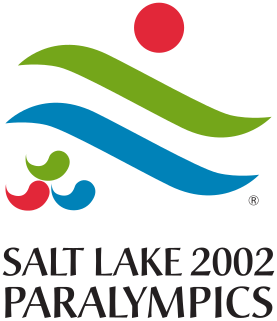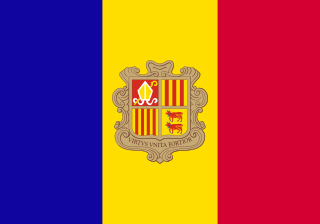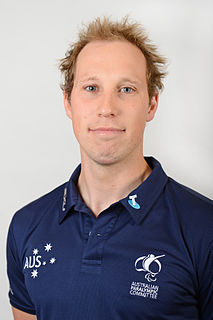
Alpine skiing at the 2002 Winter Olympics consisted of ten events held February 10–23 in the United States near Salt Lake City, Utah. The downhill, super-G, and combined events were held at Snowbasin, the giant slaloms at Park City, and the slaloms at adjacent Deer Valley.

The 2002 Winter Paralympics, the 8th Paralympic Winter Games, were held in Salt Lake City, United States, from March 7 to 16, 2002. A total of 416 athletes from 36 nations participated. They were the first Winter Paralympics in the American continent. These were the first Paralympic Winter Games for Andorra, Chile, China, Croatia, Greece, and Hungary. Ragnhild Myklebust of Norway won five gold medals in skiing and biathlon, becoming the most successful Winter Paralympic athlete of all time with 22 medals, 17 of them gold.

Andorra sent a delegation to compete at the 2006 Winter Olympics in Turin, Italy, from 10–26 February 2006. The Andorran delegation consisted of three competitors, two in alpine skiing and one in cross-country skiing. Roger Vidosa provided Andorra's best performance at these Games, with a 27th-place finish in the men's slalom alpine skiing event. As of these Games, Andorra has never won an Olympic medal.

Paralympic alpine skiing is an adaptation of alpine skiing for athletes with a disability. The sport evolved from the efforts of disabled veterans in Germany and Austria during and after the Second World War. The sport is governed by the International Paralympic Committee Sports Committee. The primary equipment used includes outrigger skis, sit-skis, and mono-skis. Para-alpine skiing disciplines include the Downhill, Super-G, Giant Slalom, Slalom, Super Combined and Snowboard.

South Africa sent a delegation to compete at the 2002 Winter Olympics in Salt Lake City, United States from 8–24 February 2002. This was South Africa's fourth time appearing at a Winter Olympic Games. The nation's delegation consisted of a single alpine skier, Alexander Heath. In his best performance, he finished 27th in the men's slalom.

Cyprus sent a delegation to compete at the 2002 Winter Olympics in Salt Lake City, United States from 8–24 February 2002. This was Cyprus' seventh consecutive appearance at a Winter Olympic Games after their debut at the 1980 Winter Olympics. The delegation consisted of one athlete, Theodoros Christodoulou, an alpine skier. He finished 54th in the giant slalom and failed to complete the slalom.

Andorra sent a delegation to compete at the 2002 Winter Olympics in Salt Lake City, United States from 8–24 February 2002. This was Andorra's seventh consecutive appearance at a Winter Olympic Games. The Andorran delegation consisted of three alpine skiers; Victor Gómez, Alex Antor, and Vicky Grau. Their best performance in any event was 24th place by Grau in the women's slalom.

Fiji sent a delegation to compete at the 2002 Winter Olympics, in Salt Lake City, Utah, United States from February 8–24, 2002. This was the nation's third appearance at a Winter Olympic Games. The delegation consisted of a single athlete, alpine skier Laurence Thoms. He competed in both the slalom, where he failed to complete his first run, and in the giant slalom, in which he finished 55th out of the 57 skiers who successfully completed both of their runs. Thoms gained media attention for representing a tropical nation at the Winter Olympics.

Bosnia and Herzegovina sent a delegation to compete at the 2002 Winter Olympics in Salt Lake City, United States from 8–24 February 2002. This was the nation's third time participating in a Winter Olympic Games. The delegation consisted of two alpine skiers, Tahir Bisić and Enis Bećirbegović. Bisić finished in 29th place in the men's slalom, and 44th in the giant slalom. Bećirbegović failed to finish the giant slalom, his only event.

Tajikistan sent a delegation to compete in the 2002 Winter Olympics in Salt Lake City, United States, held 8–24 February 2002. This was Tajikistan's first time participating in a Winter Olympic Games. The country sent one representative, alpine skier Andrey Drygin. He failed to finish either of his events.
Alpine skiing at the 2002 Winter Paralympics consisted of 53 events, 34 for men and 19 for women which all took place at the Snowbasin Ski Area.

Australia competed at the 2002 Winter Paralympics in Salt Lake City, Utah, United States from 8 March to 19 March 2002. The Salt Lake Paralympics are the eighth such winter games, the first Winter Paralympics ever in North America and the first Winter Paralympics ever set up by an Olympic organizing committee. Although many of the Paralympic expenses were covered by dual planning with the Olympics, organizers still spent about $60 million on the Paralympics, including $5 million on the opening and closing ceremonies. The Salt Lake Games featured 92 events across four sports: alpine skiing, biathlon, cross-country, and ice sledge hockey. The 36 competing countries sent a total of 416 participants. Australia was represented by six male alpine skiers: Peter Boonaerts, Bart Bunting, Michael Milton, Scott Adams, Cameron Rahles-Rahbula, and Mark Drinnan. The medal haul was seven, consisting of six gold and one silver. Australia finished 8th overall in the gold and total medal count, making it the country's most successful Winter Games in terms of gold medals.

Cameron Rahles-Rahbula is a former Paralympic alpine skier from Australia. He won two bronze medals at the 2010 Winter Paralympics in Vancouver. He represented Australia in four Paralympics, stating with the 2002 Winter Paralympics in Salt Lake City and the 2006 Winter Paralympics in Torino. He did not compete in any events at the 2014 Winter Paralympics in Sochi due to knee and ankle injuries suffered during the warm up for the downhill event of the Games but carried the Australian flag in the Parade of Nations at the Opening Ceremony. He also won two gold medals and a silver medal at the 2004 IPC Alpine Skiing World Championships in Wildschönau, Austria, and a gold and a bronze medal at the 2009 World Championships in Jeongseon, Korea. He retired after the Sochi Games.
LW12 is a para-Alpine and para-Nordic sit skiing sport class defined by the International Paralympic Committee (IPC). An LW12 skier needs to meet a minimum of one of several conditions including a single below knee but above ankle amputation, monoplegia that exhibits similar to below knee amputation, legs of different length where there is at least a 7 centimetres difference, combined muscle strength in the lower extremities less than 71. For international competitions, classification is done through IPC Alpine Skiing or IPC Nordic Skiing. For sub-international competitions, classification is done by a national federation such as Alpine Canada. For para-Alpine, this class is subdivided into two subclasses.: LW12.1 and LW12.2. A new sit-skier competitor with only national classification will compete as LW12.2 in international competitions until they have been internationally classified.
LW5/7 is a standing para-Alpine and para-Nordic skiing classification for skiers with upper extremity issues in both limbs that may include double amputation of both arms and hands or dysmelia of the upper limbs. The class has three subclasses defined by the location of the disability on the upper extremities. International classification is done by IPC Alpine Skiing and IPC Nordic Skiing. On the national level, classification is handled by national sports federation such as Cross-Country Canada.

LW6/8 is a para-Alpine and para-Nordic standing skiing sport class, a classification defined by the International Paralympic Committee (IPC) for people with an upper extremity issue who have paralysis, motor paresis affecting one arm, a single upper arm amputation or CP8 classified cerebral palsy. LW6/8 skiers use two skis and one pole in both para-Alpine and para-Nordic skiing.

Andorra sent a delegation to compete at the 2014 Winter Paralympics in Sochi, Russia, held between 7–16 March 2014. This marked the nation's fourth participation in a Winter Paralympics The delegation consisted of a single athlete, alpine skier Xavier Fernandez, who failed to post a finishing time in either of the two events he competed in.

Andorra sent competitors to the 2018 Winter Paralympics in Pyeongchang, South Korea. They will compete in para-alpine skiing. The country first went to the Winter Paralympics in 2002. When they arrive in Pyeongchang, they will be competing in their fifth Winter Paralympics.
Denis Barbet is a French para-alpine skier. He represented France at the 2002 Winter Paralympics and at the 2006 Winter Paralympics.
Romain Riboud is a French para-alpine skier. He represented France at four Winter Paralympics: in 2002, 2006, 2010 and 2014. In 2002 he won the silver medals in the Men's Giant Slalom LW3,5/7,9 and the Men's Super-G LW3,5/7,9 events.












